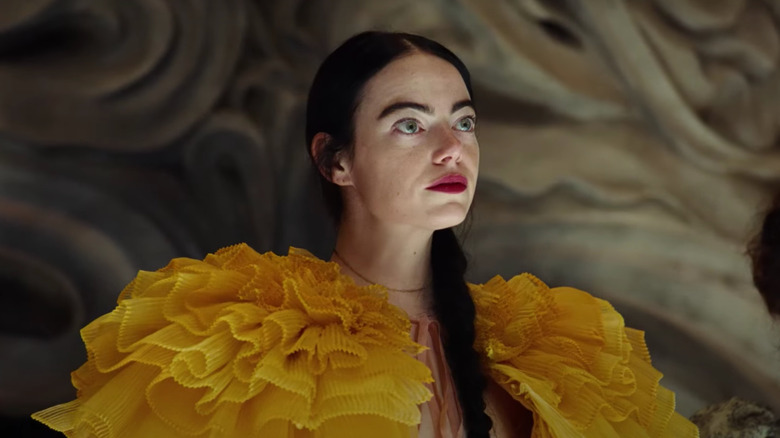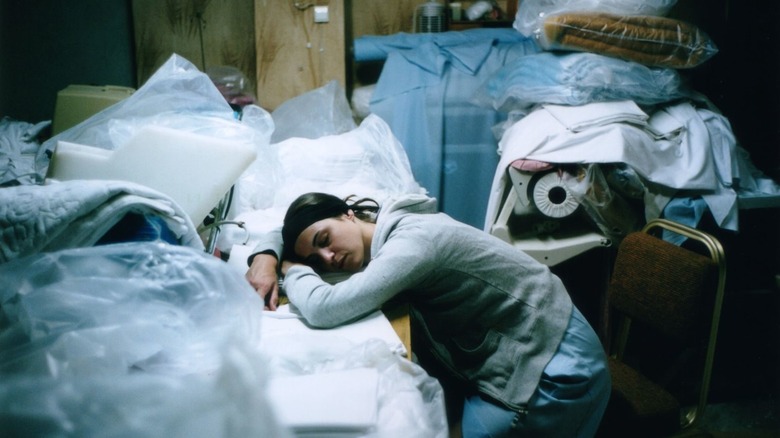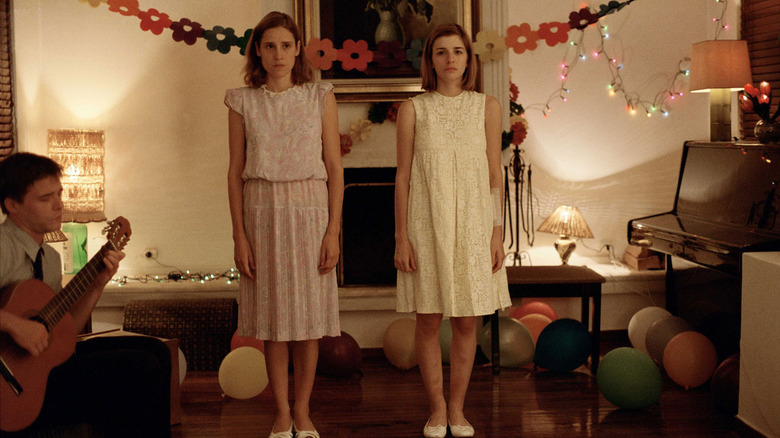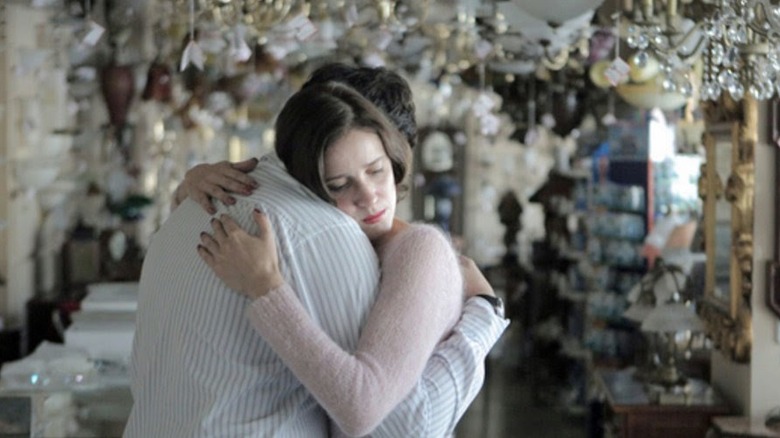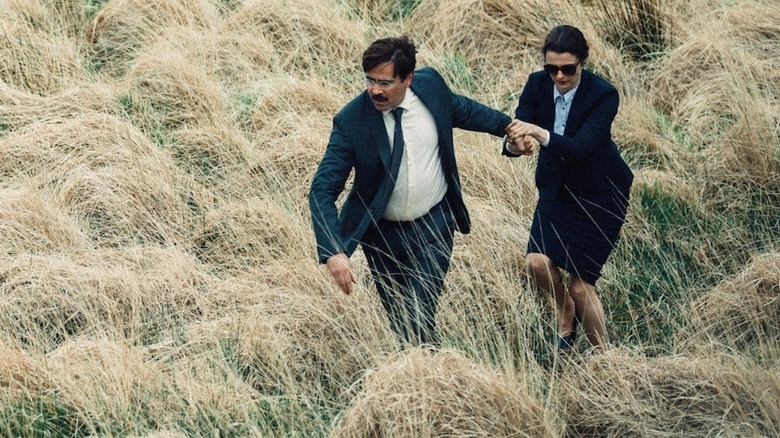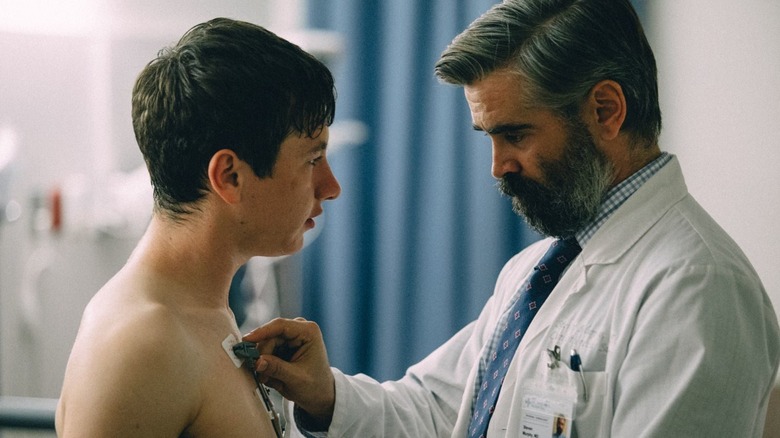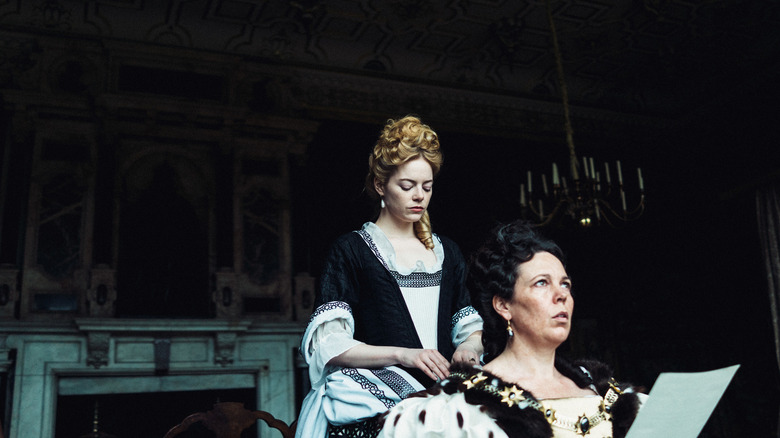Poor Things: The Yorgos Lanthimos Movies You Should Watch First
With the first trailer for "Poor Things" finally out in the world and a release date set for September 8, fans of Greek director and writer Yorgos Lanthimos are getting excited for the auteur's latest project, which stars his repeat collaborator Emma Stone as a deceased young woman who's given a second chance at life... in a very literal way. Her corpse is resurrected by a scientist — played by Willem Dafoe — and she's able to live outside of the confines of society as a result.
Lanthimos adapted the film from Alasdair Gray's 1992 novel (and worked with screenwriter and frequent partner Tony McNamara), and if you're familiar with the director's body of work, you probably know you can expect plenty of fish-eye lenses, anachronistic touches throughout, phenomenal performances, and a strange bent to the entire movie. A one-of-a-kind director, Lanthimos has created a style for himself akin to someone like Wes Anderson, albeit with far fewer movies under his belt; as of this writing and aside from "Poor Things" and his upcoming anthology film "And" (which also stars Stone), he's only directed six full-length feature films.
If you're new to Lanthimos' work but interested in the cast of "Poor Things" — which includes Mark Ruffalo, Ramy Youssef, Margaret Qualley, Jerrod Carmichael, Christopher Abbott, and Kathryn Hunter — you'll want to check out his previous work. Here's the essential Yorgos Lanthimos viewing list.
Kinetta was Yorgos Lanthimos' first buzzy project
After co-directing "My Best Friend" in 2001 alongside Greek contemporary Lakis Lazopoulos, Lanthimos struck out on his own in 2005 with "Kinsetta." The film, which was written by Lanthimos and Yorgos Kakanakis, is performed Greek by lead actors Evangelia Randou, Aris Servetalis, Costas Xikominos and tells the story of a resort in Greece called Kinetta. During the off-season, three strangers — Randou, Servetalis, and Xikominos — visit Kinetta and form an unexpected bond, despite their differences; one is a police officer with some strange proclivities, one is a hotel maid, and one is a photographer. The three of them start to participate in a strange activity of their choosing and recreate brutal murders, and things only devolve from there.
The film only got a limited release at a museum in the United States initially, but in 2019, it finally got a theatrical release. John DeFore at The Hollywood Reporter wrote of the movie, "Lanthimos' first solo-directed film (following the reportedly more commercial 'My Best Friend', written and co-helmed by Lakiz Lazopoulos) isn't as arresting in its strangeness, but introduces themes that would continue even into his lauded English-language work," so if you're trying to revisit all things Lanthimos, start with "Kinetta."
Dogtooth was a huge break for Yorgos Lanthimos
Lanthimos' biggest break yet came four years after "Kinetta" with "Dogtooth," which marked his first real international success. Released in 2009, the movie won the Prix Un Certain Regard at that year's Cannes Film Festival, and ultimately, it even scored an Academy Award nomination for Best Foreign Language Film.
Working, as he did in "Kinetta," with unnamed characters — aside from one, Christina, played by Anna Kalaitzidou — "Dogtooth" focuses on a bizarre family made up of a father, mother, an adult son, and two adult daughters. The parents have completely isolated their children from the outside world, telling them that there's a world beyond their home but that they can only leave and see it when they lose a "dogtooth." That's just the tip of the iceberg where this family is concerned, and pretty much none of it is fit to print here, but suffice to say, Christina gets involved and is quickly in over her head.
"Dogtooth" is, it should be said, extremely disturbing, and perhaps one of Lanthimos' most unsettling projects to date. If you're up for it, though, it gives you a good idea of how weird he can get.
Alps was Lanthimos' last project in Greek for a while
In 2011, Lanthimos wrote "Alps" alongside Efthymis Filippou — who would become a collaborator from there — and marked his last fully non-English film for at least a little while. (As of this writing, all of Lanthimos' post-"Alps" feature films have been in English, or at least mostly in English; one incorporates French.) If you thought "Dogtooth" sounded strange, "Alps" definitely continues that pattern.
The title of the film refers to a group that calls themselves Alps after the mountain range — with code names like Mont Blanc and Monte Rosa — who perform a truly bizarre service for anyone in need. Specifically, members of the group will visit grieving people who have recent lost a loved one, and they'll just... pretend to be that dead loved one. Unsurprisingly, this leads to some seriously strange and undeniably inappropriate connections, which then leads the Alps to start fracturing.
The movie also competed in major film festivals; it premiered at the Venice Film Festival and won Filippou and Lanthimos the Osella for Best Screenplay, and it also competed at the Sydney Film Festival, winning Official Competition Prize for New Directions in Cinema. Fans of Lanthimos looking to really round out a deep dive into his work would be remiss to miss "Alps."
The Lobster marks Yorgos Lanthimos' first big worldwide success
Lanthimos' first three feature films definitely speak to his style, and in 2015, he brought his talents to a wider audience by enlisting some major A-list stars. "The Lobster," which premiered at Cannes Film Festival and won the Jury Prize that year (while also competing for the Palme d'or, the festival's top honor), stars Colin Farrell as David, a struggling bachelor who decides to visit a hotel that promises its visitors that it will help them find true love. There's a catch, though; if you don't find your soulmate within a mere 45 days, you'll get turned into an animal.
Narrated by Rachel Weisz — who also plays a "short-sighted" woman who has an illicit affair with David outside of the hotel's jurisdiction — "The Lobster" is a dark, psychosexual, and often weirdly funny wild ride, and Lanthimos' ambition was rewarded when he scored his second Oscar nod for the film's original screenplay (alongside Efthimis Filippou). If you have a friend who's seen this movie, you might remember it being the one they couldn't shut up about in 2015, so see what all the chatter's about for yourself.
The Killing of a Sacred Deer continued Lanthimos' strange, successful streak
None of Lanthimos' movies are really for the faint of heart, but in terms of his English language ventures, "The Killing of a Sacred Deer" might be his most unsettling and absolute darkest. Farrell re-teams with the director to play Dr. Steven Murphy, who connects with the son of one of his deceased patients, Martin Lang (Barry Keoghan). Martin, though, has way too many tricks up his sleeve, and all of them are horrifying; not only does he keep trying to hook Steven up with his mother (Alicia Silverstone), despite that Steven has a happy family with his wife Anna (Nicole Kidman). Before long, it devolves to the point where Martin is telling Steven that one member of the Murphy family has to be sacrificed in exchange for Martin's father, who died on Steven's operating table... and the whole family starts getting mysteriously sick.
With an even larger cast of outstanding actors, Lanthimos earned more rave reviews for "The Killing of a Sacred Deer," competing once again for the Palme d'or at Cannes and scoring critical acclaim and a solid box office haul. If you're only familiar with "The Lobster" and the next film on this list, go back and catch "The Killing of a Sacred Deer."
The Favourite is probably Yorgos Lanthimos' most famous movie
If you've only heard of one Yorgos Lanthimos movie, it's probably "The Favourite." Released in 2018 and marking the director's first collaboration with Emma Stone, the movie loosely adapts the life story of the famously troubled Queen Anne of England, whose infertility and myriad of other health issues led to utter instability as her reign continued. Surrounding Anne — played by Olivia Colman, who won an Oscar for her stunning performance — are any number of sycophants, but the two most important ones are Sarah Churchill, Duchess of Marlborough (Rachel Weisz) and Abigail Hill (Stone). Sarah starts the film as the "favourite" to the Queen, and viewers later learn their relationship is... very close, but as a result, Sarah is the one who's really in power. Enter Abigail, Sarah's poorer and younger cousin, who works to supplant Sarah and become the "favourite," and while she succeeds, her rewards aren't quite what she expected.
Flanked by foolish male characters played by Joe Alwyn and Nicholas Hoult — whose role can definitely be seen as a precedent for his outlandish performance on "The Great" — the three women at the center of the movie make it exceptional, and Lanthimos' reliance on strange cinematography and fish-eye lenses makes it all feel that much more unsettling. The movie was nominated for Best Picture in 2019 and earned Colman her first statuette, and there's no question that it's the biggest project of Lanthimos' career to date.
